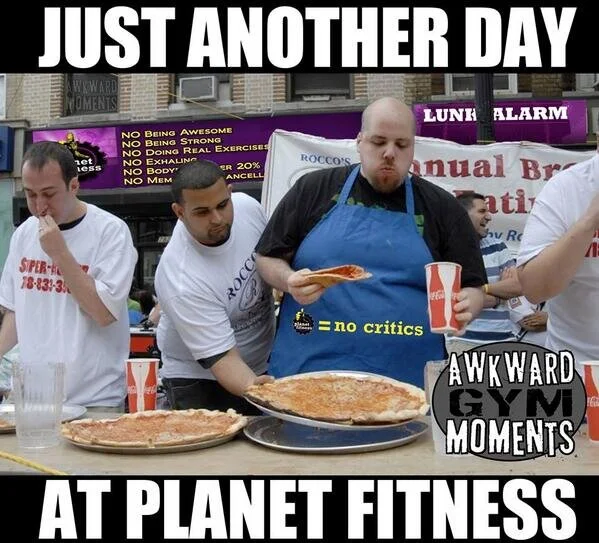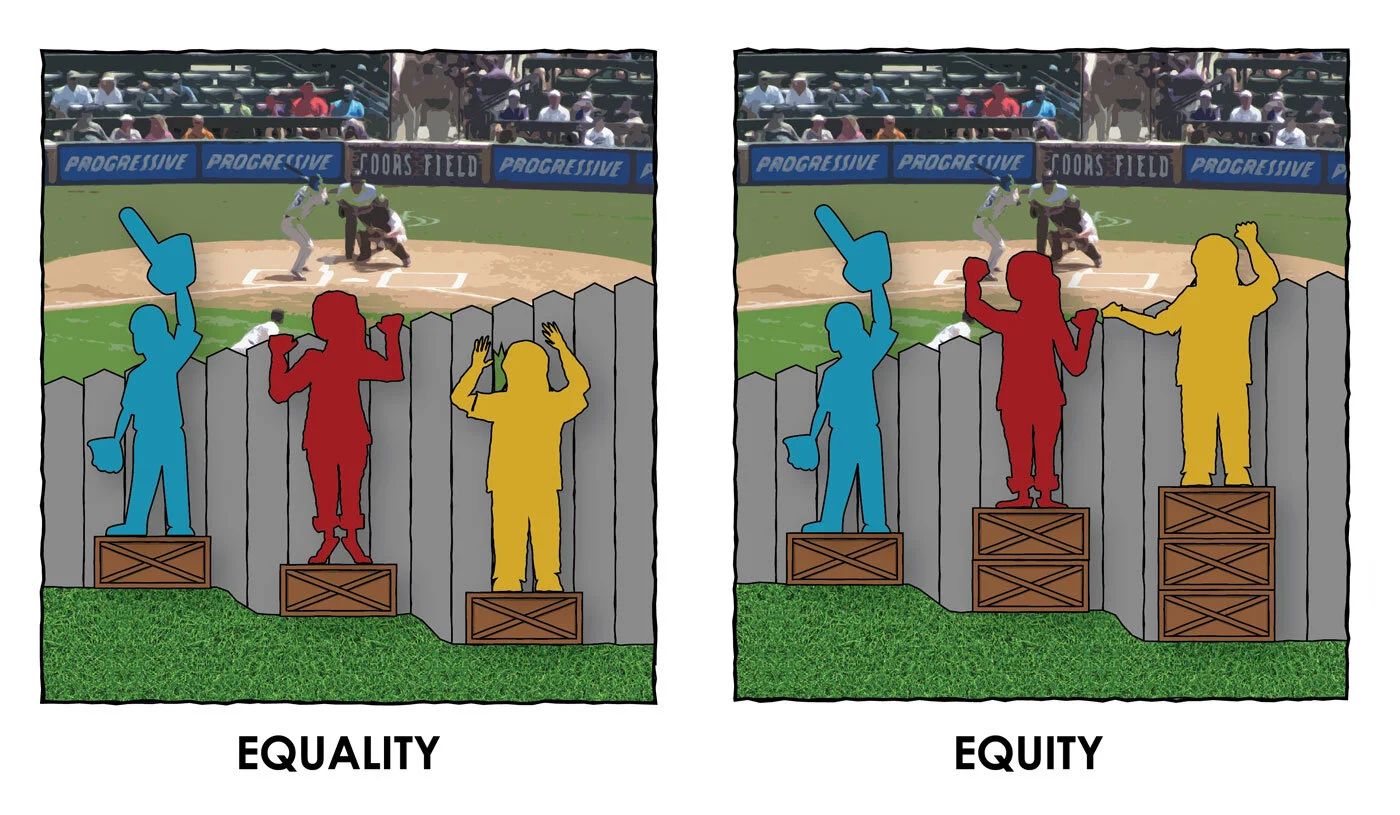Equality or Equity? The Slow Crawl to a Planet Fitness World
“You are now entering the Judgement Free Zone.”
In the myriad gymnasiums in any given city in America, most look the same. The equipment, the locker rooms, the mirrors. All pretty basic stuff. The standout is Planet Fitness because this gym is about courting the people who, in their intimidation in the face of those few who really work out, feel out of place and left out. Planet Fitness is a gym with a mantra: you don’t have to work that hard as long as you are a member.
Planet Fitness succeeds by leveling down the very idea of self improvement by emphasizing acceptance, You be you equity over, you know, getting in shape.
Along with the continuing need to define racism, anti-racism, white privilege, ableism, sexism, misogyny, misandry, the effects of slavery and Jim Crow on current economic disparity, and socialism, the debate at the heart of it all is between a push for equality or equity.
A recent Medium read (yes. I know. It’s fucking Medium, which has become HuffPost without the benefit of editors or McSwenis with the benefit of a sense of humor) parses out the difference this way:
Equality means sameness. The goal of racial equality is for everyone to be treated the same, but that is not the focus of racial justice. The focus of racial justice is equity.
Equity is fairness and justice. For success to occur, everyone must be able to begin from the same point and be given the same resources.
In terms of the United States specifically this also brings to bear the dueling concepts of The Melting Pot or The Salad Bowl. The Melting Pot requires assimilation and settling into a framework of homogenization culturally. The Salad Bowl requires no such blending of cultures and instead necessitates the friction of competing cultures available to all.
The 20th Century, despite its shitty embrace of inequality in terms of anyone not white, male, and financially successful, trumpeted The Melting Pot. As the century turned the corner those who were required to assimilate finally had had enough and fought back. The Rainbow Coalition of George McGovern, the Civil Rights Act, Affirmative Action, and the push for the ERA are notable in that fight.
Equality only works if everyone is treated equally. Not everyone was so we entered the 21st Century with the new paradigm of equity.
The common graphic used to demonstrate this is this one:
Equality is when everyone is treated the same; equity is a compensation for those starting at a disadvantage.
Sounds fair. Seems like the way to go because equity is, as the Medium writer put it, about “...fairness and justice...” Equity is about shaving off the rough edges of existence to compensate people for either unfair obstacles placed in front of them or unfair disadvantages with which they were born.
Recently, a friend of mine wrote me in regards to the assertion I made that a Republican man and I found some common ground in a civil political discussion. Her response was that he would decidedly not have the same civil discussion with my wife. I disagreed (mostly due to the fact that this specific guy was more like me than the horrors of toxic men we read about in other countless Medium pieces).
My friend is incredibly smart and knows her way around words.
Tall guys don't have to reach to get into the cabinet over the fridge. Tall guys don't have to reach to get to suitcase on the shelf in the closet. Tall guys don't have to reach get the snow off the top of the car. They can do all those things without mechanically having to straighten their arm.
I know tall guys don't reach, no matter what you say. Just like I know and there is no doubt in my mind that, despite how pal-y and talking about Reagan you were with that guy, that guy would not treat your wife the same way he treated you.
I know it because of her body politic, and because of my body politic, and of yours, even if you're 2 years shy of being a boomer. Yeah, you scored one for the libtards by having a nice chat with the guy. It must be nice to be a 55 year old white guy who can't be over-powered at the drop of a hat. Just like the angle of the hand as it enters the water, and the lift of the elbow, and shoulder roll, you might not think those things matter, but I know they do.
Her point is well-taken. While not a tall guy, I get the metaphor and the fact that I am a college-educated, employed, conventionally dressed, middle-aged white heterosexual dude has afforded me the exact laziness she points out. My birth and specific circumstances beyond my control have put me right there with the tall guys who don’t really have to overcome much adversity to function in a world built for tall guys.
It is nice. It’s easier. It’s like going to Planet Fitness where core in its marketing is that you can go to the gym and not have to work out that hard and pretend you are advancing your health with as little resistance as possible. I mean, in terms of privilege, who in their right mind would give up that simple ability to ignore the hardships others deal with? For a whole 17 percent of the population who have been actively prevented from joining the Planet Fitness less effort for maximum feels mode, I imagine the prospect of finally getting that membership card looks a lot better than continuing to struggle.
The problem with equity as I see it is that it drives us to all be as lazy as the tall guys. Remove all possible obstacles and things will even out in a more just manner. The long term effect is that everyone is equally able to join Planet Fitness and perpetuate a society of the mediocre. Everyone gets a membership and no one has to work harder than the least capable in the gym. A whole room full of flabby, slightly sweaty workout buddies, eating donuts in their Nike shirts and patting each other on the back for no one really doing much more than anyone else.
Equity means an equal playing field but to what end? What happens when the short guy gets a stool to stand on? Does he then achieve as much as the lazy-ass tall guy? Is it more equitable that we dig a hole for the tall guy and surgically shorten his arms? If someone is naturally gifted at seeing long distances (unfair to those who are near-sighted) do we suggest that one of his eyes be gouged to make things more equitable?
Like the public school system that long ago decided that gifted classes were unfair to the hopeless masses unable to grasp trigonometry in eighth grade, equity begins to look more like the death of the species in pursuit of making everyone feel good about themselves while doing all we can to marginalize those who benefit the most from the status quo.
I grew up being taught that adversity, when confronted and pushed up against, strengthens one. Muscles are only built with resistance. Am I saying that we should make things harder for people for their own good? Of course not. I’m saying that we all want equality (except for the most reprehensible in our midst) and most think that fairness and justice for everyone is equitable and desirable.
There is, however, a double edge to that sword. Unless the move for equity is balanced with the realities of both the abhorrent nature of human beings (all of them, not just the tall guys) and the inherent lack of fairness and justice in nature, we’re all pushing toward a whole other type of homogenization: a melting pot of half-assed wannabe gym rats content that the bar of achievement is simply low enough for the least capable to reach.
Imagining a truly equitable future, where everyone starts with the same resources and the same opportunities is a utopian fantasy. Some people are simply born with more capacity to achieve than others and all the rhetoric in the world isn’t going to change that. Some, through nature or nurture, are going to be tall guys, others are going to be short guys. We can even out the playing field but nature always wins out.
Can we do better than we have? Christ, I hope so. Rather than adoption of the Planet Fitness model where no one is really allowed to work too hard or achieve too much, if we want a better society, we need better people. Better people come from struggle and the overcoming of obstacles. Strength and wisdom come from hard work not donuts and pizza for everyone.


